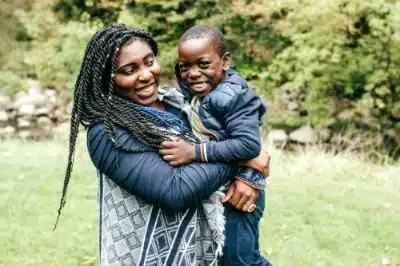If you’re considering adoption, it’s common to wonder if your child will resent you one day for this decision. While it’s common, the thought of your child one day hating you for placing them for adoption is a terrifying one. It may even make you wonder if adoption is your best option. In fact, many birth parents find themselves wondering, “Will my child hate me for choosing adoption?”
When you’re faced with an unplanned pregnancy, it might seem like everyone in your life becomes an expert and wants to tell you what to do. People who are unsupportive of adoption might say to you that your child will hate you for “giving them up.” Because they don’t understand how open adoption works and have a fear of the unknown, people might believe that adopted children grow up wondering about who their birth parents are and never finding a sense of self.

While these questions may linger, the more open type of adoptions today means that people are more open about their reasons for choosing adoption. Children no longer have to wonder about a faceless, secret parent they have never met or heard of.
In this video, Julia from Lifetime Adoption answers two questions we often hear from expectant mothers: “Will my baby hate me for placing them for adoption?” and “Is it selfish to consider adoption for my baby?” Plus, you can hear from an adoptee, Alexa, about her positive adoption experience.
Benefits of Open Adoption
With open adoption, you’re able to set expectations for contact with your child and their adoptive parents. You can see your child again. Plus, you can develop a meaningful, positive relationship with your child as they grow up with their adoptive parents.
One of the biggest benefits of open adoption is the fact that adopted children grow up with the ability to know and contact their birth families. As a result, these children grow up knowing of their birth mothers and maybe even keeping on touch with them. Adoption isn’t a secret any longer. It’s talked about and celebrated in today’s open adoptions. Because of this, fewer adopted children will experience resentment.
By maintaining a relationship with your child and their adoptive parents, you’re helping your child develop a positive identity as an adoptee. Staying in touch with your child helps to answer any questions they might have about their origins as they grow up. You can also share your reasons for choosing adoption. The truth is that there are so many reasons you have selected this option, and you may realize that there were many more reasons than you imagined when you initially made the decision. Those reasons may include:
- Financial concerns about raising a child
- Desire to attend college
- Not feeling emotionally ready to raise a child
- Not having a father in the picture
- Lack of resources to provide for a child, including family support
- Hope that the child will grow up in a different environment
How do I keep in contact with my child after the adoption?
The type of contact you have will be determined by what you’d like and what you work out with the adoptive parents. Your Adoption Specialist at Lifetime will help you find adoptive parents who share your contact preferences. The adoptive couple you choose will be responsible for maintaining their end of the post-adoption contact agreement.
As you create your adoption plan, future contact could happen through any of these methods or a combination of a few:
- In-person visits
- Pictures and letters sent through Lifetime
- Video chats (such as Skype)
- FaceTime calls
- Social media such as Instagram, Facebook, or TikTok
- Emails
- Letters or cards
- Text messages
- Phone calls
Because of modern technology, it’s now even easier for open adoption to feel like a comfortable, extended family type of relationship. No longer does open adoption necessarily have to feel scheduled, choreographed, or scripted. It can develop into its own relationship, in ways that work for all sides involved, just like any connection between people who truly care about each other.
What will the adoptive parents tell my child about me?
Lifetime advises our adoptive parents to be open and honest with children about their adoption stories from the beginning. Most start with books and story time to help a child get familiar with the concept of adoption. They’ll share more details of the adoption story as the child gets older, making sure that the info is age-appropriate to the child’s stage of development. But most importantly, the adoptive parents will try to make sure the child has a positive identity and knows that they’re safe and loved.
If children grow up always knowing that they were adopted and forever loved by both their birth and adoptive families, then there won’t be a moment when they wonder why they were “given up” or question whether or not they were “wanted.”
So many adoptive parents celebrate adoption as a positive, beautiful experience that makes each adopted child special. They openly share their child’s adoption story with the child as they grow up and might even make it a family tradition to celebrate their child’s adoption every year.
Today, adopted children celebrate their adoption stories. We believe that adoption shouldn’t be a dark family secret.
With open adoption, children grow up knowing that their birth parents gave them a beautiful gift in choosing adoption. They grow up knowing that adoption is a loving decision and it’s one to be proud of.
Writing a Letter to Your Child
If you’re still afraid that your child may resent or hate you for choosing adoption, you could write a letter or make a video that explains your decisions. In fact, many open adoptions involve an exchange of emails, photos, and videos back and forth between the adoptive family and birth family.
As you write a letter to your child, you have the opportunity to explain to your child that you wanted to provide him or her with two loving parents, financial stability, and more opportunities for success. Share your reasons for choosing adoption with your child, and that it was done out of your love for them. You can tell him or her why you selected the adoptive parents that you did. You may even see your own emotions shifting when you relay this information to your child.
When your child has this letter from you, he or she knows your story. You can discuss your hobbies, appearance, and strengths so that your child can compare them to their own. By connecting in this way, your child will also discover their own story, which is a powerful thing. It helps build a positive connection.
In this communication, you can also allow your child to get to know other members of your family, including his or her birth father. In fact, the birth father may even have his fears alleviated by writing his own letter to his child.
Express Gratitude and Positivity
When you communicate with your child, make sure to speak positively about his or her adoption and adoptive parents. You can also strengthen your child’s opinion of you by expressing gratitude. It can help to share with your child how thankful you are to have had the option of adoption at a difficult point in your life.
It’s normal to feel resentment, anger, and other negative emotions after you place. Expressions of gratitude and thanks can go a long way in showing your child that they are where they are meant to be.
The Long-Term Impact of Open Adoption
Adoption can have lifetime effects, and most of them are positive nowadays. Many people have a negative view of adoption based on stories they have heard from the past. Adoption used to be something people did not want to talk about. Today, the landscape of adoption has changed so much. People talk about their feelings, and children can learn more about their birth family without shame.
Open adoption has changed things, and you no longer have to ask, “Will my child hate me for choosing adoption?” You can rest assured, trusting that one day, even if it is not today, your child will grow to appreciate that you gave them the best gift possible: a loving family and opportunities for success.
Editor’s Note: This article was originally published on February 7, 2020, and has since been updated.
As Vice President of Lifetime Adoption, Heather Featherston holds an MBA and is passionate about working with those facing adoption, pregnancy, and parenting issues. Heather has conducted training for birth parent advocates, spoken to professional groups, and has appeared on television and radio to discuss the multiple aspects of adoption. She has provided one-on-one support to women and hopeful adoptive parents working through adoption decisions.
Since 2002, she has been helping pregnant women and others in crisis to learn more about adoption. Heather also trains and speaks nationwide to pregnancy clinics to effectively meet the needs of women who want to explore adoption for their child. Today, she continues to address the concerns women have about adoption and supports the needs of women who choose adoption for their child.
As a published author of the book Called to Adoption, Featherston loves to see God’s hand at work every day as she helps children and families come together through adoption.






0 Comments